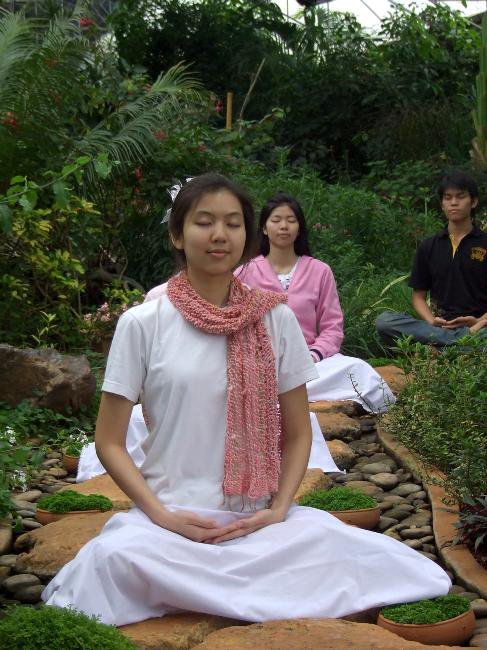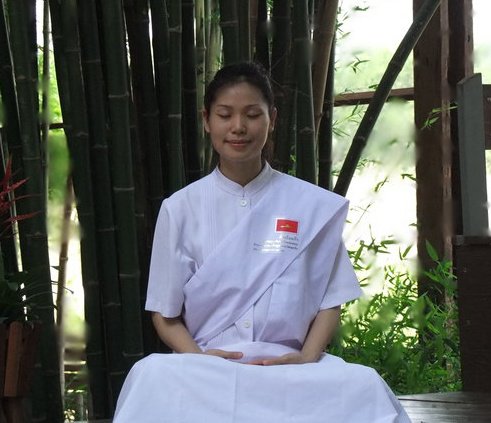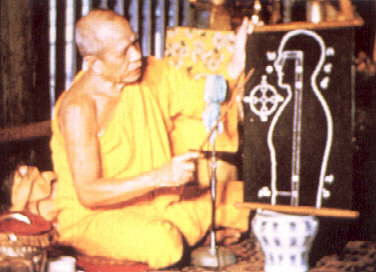Blessing Nineteen:
Abstaining from Unwholesomeness
Abstaining from Unwholesomeness

D. ABSTAINING FROM UNWHOLE-SOMENESS
D.1 Definitions
This blessing uses two words to describe the way in which unwholesomeness can be eradicated from the mind. ‘Arati’ means giving up any unwholesome habits which we have picked up in the past — i.e. eradication. ‘Virati’ means not picking up any further types of unwholesome habit — i.e. by avoidance.
D.2 Strategies for abstinence
The way we practice eradication and avoidance of unwholesomeness depends on the exact type of unwholesomeness. Even medicine needs to be separated into different classes such as internal, external, vitamins etc. for convenience in using them to cure illnesses. In the same way if we understand the different sorts of unwholesomeness, we will be thorough in our giving up and avoidance of unwholesomeness behaviours and practice will be more convenient for us. Unwholesomeness is categorized according to its refinement and the appropriate way to avoid such unwholesomeness depends on their refinement.
D.2.1 Gross unwholesomeness
Gross unwholesomeness includes physical and verbal misdeed such as killing, stealing, committing adultery and lying. No-one stops doing evil by accident. One has to start with the intention to avoid evil. It is like the person who wants to give up smoking has to start with the intention to give up smoking first of all. The intention to avoid evil is called “virati” in the Pali or “veramaṇī” which you will recognize from the requesting of the Precepts. In fact there are three ways in which people avail themselves of the intention to avoid evil (DA.i.305, KhA.142).
1. Situational avoidance [sampattavirati]: This means avoidance of evil on a situational basis. There is no public declaration that a person will avoid evil in advance — he decides on the spur of the moment when confronted with the situation. If you see a fish washed up on the beach and you decide on the spur of the moment to throw it back into the water out of compassion, rather than killing it — this is the sort of avoidance which we call sampattavirati. Perhaps you would turn in a lost wallet with all of the money instead of keeping it for yourself, for fear of being accused of stealing. Such avoidance of evil occurs as the result of the important ability to teach oneself i.e. the fear and shame of evil or the consequences of evil [hiri-ottappa].
2. Planned Avoidance [samādānavirati]: This means avoidance of evil by formally requesting the giving of the precepts by a monk. Some people simply make a vow to keep the Precepts each day in front of the shrine. Even if someone were to give you a bottle of beer, not because you are ashamed to do so, but because you have taken the Five Precepts that day, you will turn down the offer for fear of breaking your vow.
3. Transcendental Avoidance [samucchedavirati]: This is absolute avoidance of evil of the type achieved by those who have attained the stages of Buddhist sainthood. Their mind is on such a high level, that even the intention to do the evil doesn’t enter into the mind, let alone the outcomes of evil thought like speech or action.
Although there are different ways of abstaining from unwholesomeness, in practice, keeping the Precepts is the most workable. The Precepts are the means by which gross unwholesomeness can be avoided. Thus we use the Five Precepts, the Eight Precepts, the Ten Precepts and the 227 Precepts.
D.2.2 Medium unwholesomeness
Unwholesomeness at the medium level is anything that causes the mind to wander away from the centre of the body. The further the mind wanders from the centre of the body, the more damaging will be the things which the mind will think about — and the amount of unwholesomeness will increase in proportion. This is the reason why we must practice meditation as the way to bring the mind back from all those negative thoughts to the centre of the body.
Supposing, you are walking along and stub your toe on a step. When you are angry, your mind will go to the step. If you can bring the mind back to the centre of the body again, then the anger disappears. Even if you are not able to bring the mind back immediately, the sooner you can bring the mind back, the sooner will you recover from the anger. If you are slow in bringing your mind back, before long your thoughts will elaborate onto who to blame and how to get your revenge.
The same principles apply to greed. Whenever you see something as beautiful, it will cause your mind to be pulled away from the centre of the body to be with the beautiful thing. If your mind is away from the centre of the body for long enough, the thoughts that follow on will be thoughts of envy and how to obtain the thing for yourself, even if it is by dishonest means. If you see something as beautiful, if you want to maintain your quality of mind, then you should quickly bring your mind back to the centre of your body, repeat the mantra Sammā-Arahaṃ to yourself and be quickly on your way.
Therefore, when we talk about unwholesomeness at this level, we mean the distancing of the mind from the centre of the body and the associated negative thoughts. These negative ways of thinking can be categorized as five sorts of mental hindrance [nivaraṇa]. Most people overlook the damage of them. In fact they seriously impede your opportunity to do good deeds
1. Sense-desire [kāmachanda]:
2. Illwill [byāpāda]:
3. Sloth and Torpor [thīnamiddha]:
4. Absent-mindedness [uddhacca-kukkucca]
5. Doubt [vicikicchā]:
Hindrances can be overcome by the practice of meditation until one-pointedness [ekaggatā] of mind can be achieved. Some days we meditate well. Other days we have to compete with many obstacles. All this is part of the fight against impurities in the mind. Thus don’t think that if your meditation still seems to have many obstacles it is of no merit. In fact it is a fight against the unwholesome in the mind. One day in the future you achieve total victory.
D.2.3 Subtle unwholesomeness
Subtle unwholesomeness is yet harder to observe. These fetters [anusaya] (D.iii.254, A.iv.8, Vbh.383) are like habits that stop us achieving the path to Nirvana:
1. Sensual grasping [kāmarāga]:
2. Irritability [paṭigha]
3. Wrong View [diṭṭhi]
4. Doubt [vicikicchā]:
5. Looking down on others [māna]
6. Grasping for existence [bhāvarāga]
7. Ignorance [avijjā]
You have to overcome such defilements by attaining the Dhammakāya and using the Dhammakāya for insight meditation to uproot them.
D.3 Developing Conscience as Protection from Unwholesome Behaviour
Sometimes we know that our behaviour is unwholesome, but we carry on doing it nonetheless. In order to strengthen one’s conscience, the Buddha recommended the cultivation of two additional virtues — that of being ashamed of unwholesomeness [hiri] and fear of the consequences of unwholesomeness [ottappa]. Shame of unwholesomeness can be developed by recollecting:
1. Your own human status. You have to think that you are a human being and not a savage — having attained such a noble birth how can we stoop to killing, stealing or adultery?
2. Your own family. You have to remind yourself that your family has been doing good deeds for generations — so how can you bear to be the one to destroy the family name.
3. Your own age. If you remind yourself that at your age you ought to know better than to mess around with various sorts of immorality.
4. Your own past good deeds. You have to think how can you bear to spoil your track record
5. Your own knowledge. You have to think how you can be so stupid to do bad things in spite of all you have learned.
6. Your own teachers. You have to think of your spiritual teachers and academic teacher and think how they would feel about what you are doing.
Another way of thinking is to remind yourself that there are no secrets in the world. If others don’t see what we are doing, the angels will. Even if the angels don’t see, we are still witness to our own deeds. Similarly, fear of the consequences of unwholesomeness can be developed by recollecting:
1. Later Regret. If we were to do an unwholesome thing like this, it is not worth it because we will only regret it later.
2. Criticism: If we were to do an unwholesome thing like this, it is not worth it because others will criticize us for it.
3. Retribution: If we were to do an unwholesome thing like this, it is not worth it because we will only be punished later or receive the bad karma.
4. Hell Realms: If we were to do an unwholesome thing like this, it is not worth it because we will only be born in hell.
In conclusion we can say that unwholesomeness is not just breaking the Precepts but it is what happens to the mind whenever the mind is distanced from the centre of the body. To avoid unwholesome we have to train the mind to return and establish itself permanently at the centre of the body. In the beginning we have to keep the Precepts, at an intermediate level we have to train ourselves in meditation until we can attain the Dhammakāya. When we attain Dhammakāya we can meditate on insight and uproot the refined defilements from the mind too. In order to inspire yourself to train in keeping the Precepts and meditate conscientiously you should cultivate these hand-in-hand with your conscience.










